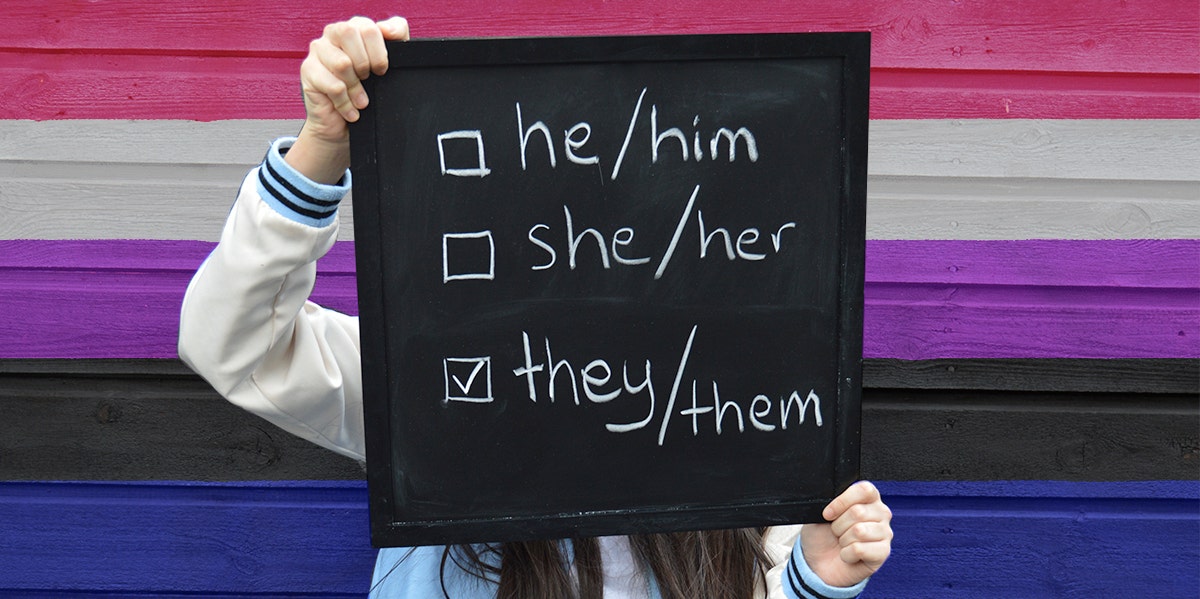What It Means To Be Genderfluid Or Non-Binary
As written by someone who is.
 Rittis & somemeans / Shutterstock
Rittis & somemeans / Shutterstock When you hear the term “non-binary,” what do you envision? Something outside the norm — possibly unusual? Possibly something foreign to you?
In the LGBTQIA+ community, the word non-binary (and oftentimes the word genderqueer as well) is used as an umbrella term for gender identities that are outside the bounds of the binary gender system.
Some trans folks identify as non-binary and some don’t.
Some folks identify themselves as genderqueer, genderfluid, non-binary.
Some may have an identity of multiple genders concurrently and identify themselves as pan-, bi- or tri-gender.
Some may identify themselves as agender or genderless ... and some may simply not label their gender identity at all.
What follows is my personal experience as a genderfluid non-binary person.
Nonbinary Seeking Nonbinary
In a world that rigidly demands unilateral binary representation from even its newborn children, existing outside of those pre-determined spaces makes life both frustrating and dangerous. Queer folks that gravitate towards each other often bond over shared interests and experiences, whether positive or negative. The same rings true of the friendships I've forged with my own queer friends.
The internet can be a wonderful resource for a queer person with no network of like-minded buddies; but like anything else in this world, it can also be dangerous.
Two of my three closest friends I originally found through the internet. I’ve been fortunate enough to make some amazing queer friends along my journey who have helped me quite a bit and shaped me into who I am. But the danger in using the internet is still ever-present, and finding other like-minded queer individuals can be difficult when you’ve also got to overcome things like mental illness and social anxiety.
And the reality is that within my predominately queer friend circle, a large percentage of them are sexual assault survivors.
Changing the Culture
The world we live in is unabashedly trying to force us to adhere to its rigid gender roles. We gender things like clothing and razors, but all it serves to do is divide us further. There’s no real difference between women’s and men’s products, and yet they can still be sold at such different rates.
The gender binary adds nothing to an evolving society — it actively causes harm.
Some children born intersex have mutilating genital surgeries performed on them as infants to try and adhere to society’s view of gender.
The act of questioning gender is commonly frowned upon.
Children are scolded for playing with toys or showing interest in clothing considered against their gender.
But collectively, we have a voice. Companies listen when enough people speak against it.
Things like clothing, make-up, razors, and deodorant have no business being gendered. Other than petitioning companies to change their policies, we can change how we discuss gender in our personal relationships, as well as working to end unnecessary stigma against those who don’t conform.
Masculine identifying people should be able to wear make-up, dresses, and skirts without being criticized. Androgyny shouldn’t be defined by thin, white individuals with flat chests and short hair. And people should be able to dress and act how they truly feel without fear of persecution.
Different Identities
Plenty of individuals may define their gender identity as simply non-binary. My best friends and I all identify as non-binary, but our individual identities are different.
For example, Frankie* — my best friend for the past decade — has always identified as agender, but has gone through periods of accepting various pronouns. My other best friend, Patty* simply identifies as non-binary and accepts all pronouns. I myself have always felt outside the gender binary but had no access to the terminology until later in life. Currently, I identify as genderfluid and non-binary, and my preferred pronouns are gender-neutral.
The fact of the matter is, gender and sexuality are ever-evolving and queer individuals may feel differently as time goes on.
Pronouns and identities can change, and so can sexual orientation and preferences. The most important thing we can do as a society is to recognize those outside the binary and treat them with respect.
*Names changed for the sake of privacy.
Slutty Girl Problems aims to give you a daily stream of funny yet thought-provoking posts about sex, dating, relationships, feminism, and many more topics. We’re honest, sex-positive, and unapologetic, all the time.
